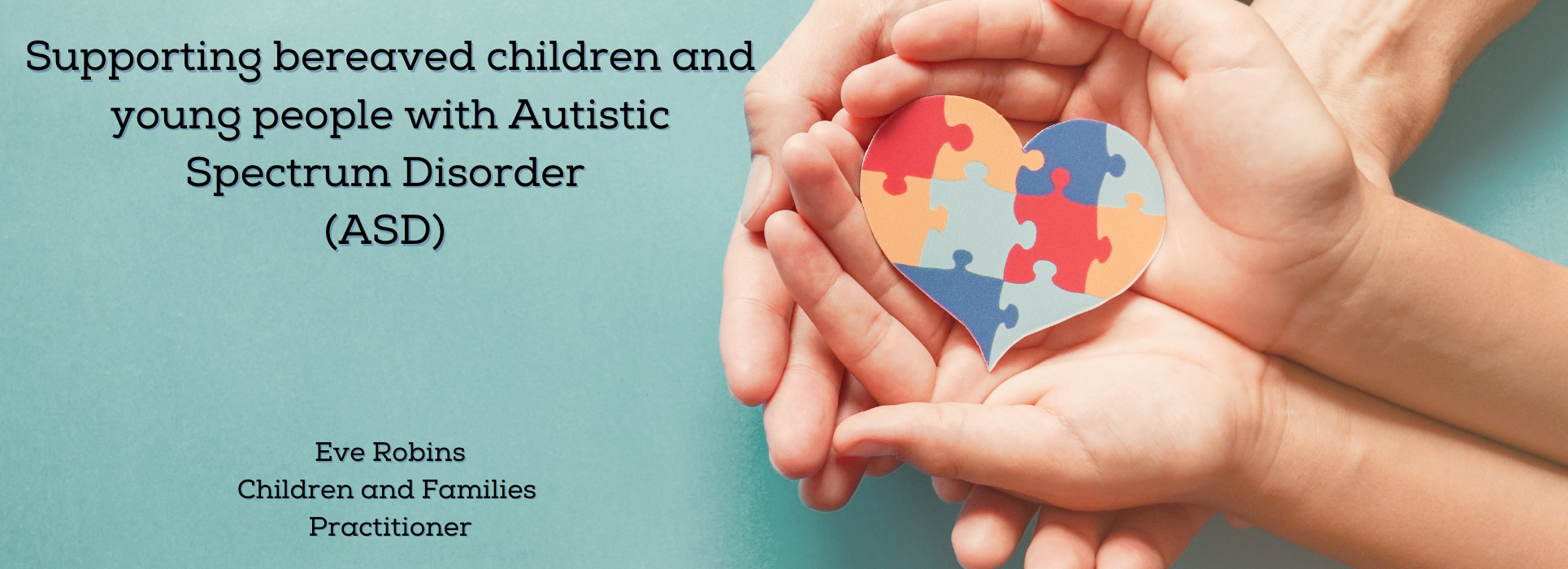Supporting bereaved children and young people with Autistic Spectrum Disorder (ASD)
Children are becoming more aware of death and dying. The impact of the current pandemic as well as social media, video games, and playground chat are increasingly exposing children to death and mortality. However, it’s often not until a child is personally impacted by a death in their close family or social circle, that we have to think about how to talk to children, including those with ASD, about death, and how we might be able to support them in their grieving.
As its name suggests, all children with ASD are unique and have a spectrum of abilities and disabilities. In many ways, bereaved children with ASD are like any other child. They need their grief to be acknowledged, they need a simple explanation of what happened using clear language, and they need the support of those they love around them. However, it might be helpful to think about what additional barriers there might be when talking to a grieving child or young person with ASD. We are not approaching this from the point of view that children and young people with ASD are ‘lacking’ but that rather they may react differently and need a different type of response or support.
Children with ASD may experience the following difficulties or challenges when someone has died:
Language and communication difficulties
Our experience at Seesaw is that adults sometimes have more difficulty talking about death and dying than children. They use euphemisms such as “gone to sleep”, or “passed away” or “with the angels.” These statements often make it easier for the adults to talk about death without actually saying the word “dead.” We know that it’s not an easy word, but all children need straight forward language. This helps their understanding that when someone has died, it is forever which means that they won’t be coming back. It sounds harsh but it really works. Now, let’s think about a child with ASD who struggles with abstract concepts. When we use euphemisms, it becomes an abstract concept, rather than something straight forward and many children, not just children with ASD can become confused and take it literally. For example, if you say, “Daddy has gone to sleep”, they might assume that he will wake up. Using simple, clear language is very important. It is good to be mindful too of how a child or young person may communicate if they are not solely relying on language. Adapt your communication to their level of communication using aids if necessary.
Sensory processing difficulties
Many children with ASD have associated sensory processing difficulties. These can be around touch, taste, smell, sights, sounds, body awareness (proprioception) and balance. When someone close to them dies, perhaps a parent, many aspects of their life will change. For example, someone else might cook their dinner and it won’t be the same as usual or other people are in the house that aren’t normally there. It could be that flowers at the funeral smell strongly, the singing is too loud, or the seating is too hard. It is good to be aware of triggers that might upset your child, and plan accordingly if possible. Using social stories and visual aids can also help (see link below).
Heightened anxiety that in turn may increase obsessions and preoccupations
Many children with ASD have preoccupations or obsessions that they might become fixated upon. After a bereavement, tension in the family home may be heightened which in turn may increase anxiety and therefore their preoccupations or obsessions might increase. Repetitive questioning might also become a factor. It is important to think about how you talk to your child with ASD. We would recommend that families use a script that they all use collectively so that the same narrative is repeated again and again. This might help a child or young person begin to understand that their loved one has died. The preoccupations or obsessions could be their coping mechanism in a world that doesn’t make sense at the moment. Try and keep to routines as much as possible, as this is known to help.
Difficulty with information processing
When someone close to you dies, there is often a lot of information that needs to be processed in a very short period of time. Even if you have told your child with ASD very clearly that their loved one has died, it still may take some time for them to process this information, especially if it has been a sudden death. They might carry on as if nothing has happened. If there is a chance to prepare them for a death, this will help enormously. Saying to your child something like, “Nanny is very poorly. The doctors are trying very hard to make her better, but we think that she might die in the next day or so. It is really sad, but she is not in pain.” Taking photographs of the hospice or hospital prior to visiting might also be beneficial. Remember, preparation is key.
Difficulty in seeing things from another person’s perspective.
Most children with ASD are loving and affectionate on their own terms, but it is very common that some struggle with empathy and understanding that someone else may feel sad or upset. Many families have told us that their child with ASD can become quite upset or offended that other people are crying about their loved one. Having an awareness of this challenge can go a long way to accepting that a child with ASD is grieving, but they are doing it in their own way. Explaining in advance that at the funeral there will be people crying can help prepare a child or young person for what is about to happen.
Difficulty conceptualising death and its surrounding rituals
The idea of someone dying is a difficult concept for any of us to grasp. Many children with ASD struggle to understand the permanence of death. It is therefore very important to use clear language and explain that being dead means that the person is not coming back and that it is forever. The abstract concept of an afterlife can also be challenging for some children. We need to be aware that societal or religious death rituals might also be confusing. For example, children might question why they have to wear particular clothing to the funeral, or speak quietly in the crematorium, or why so many people are crying. It is worthwhile trying to pre-empt any triggers and prepare and explain to the child or young person in advance what the expectations are. Visiting places in advance might help in this preparation.
Emotional delay or extreme emotional response
Everyone expresses their grief differently and an autistic child may need your help to express their grief in their own way at their own time. Many families we have spoken to tell us that autistic children can often be very delayed in expressing their emotions, or not show their grief outwardly in the form of crying. This is normal for them. Offering support and continuing to talk to your child about their loved one is the key to this so that an environment is created that is open and loving, so that when they are ready, they feel safe to express themselves. Bereaved autistic children may become unusually upset about everyday events, in a way that appears to be out of proportion to how they would usually act, such as when their favourite game stops on the Playstation. This is often their way of expressing their underlying grief and upset.
Difficulty in organising, planning and concentrating (executive functioning)
A death in the family can trigger a lot of anxiety for an autistic child. This in turn might make it very difficult for them to concentrate on their usual daily activities, such as taking a shower or doing their homework. They might need a gentle reminder to get these things done. It is also a good idea to inform the school community of a death in the family as concentrating in the classroom might become especially difficult. Using social stories might be helpful here to frame the expectations of the day so that they have a sense of control (see link below).
More difficulty in managing and understanding their own feelings (emotional regulation)
When everything feels out of control such as when a death happens in the family, it can often feel very scary. For any child these scary feelings can often be communicated in the form of a regression in their behaviour. You might notice that an autistic child may have more tantrums or become acutely upset or disruptive. Giving them a space to talk (if they can) about what happened and helping them with naming their emotions is a good starting point. When they are less upset, it might be helpful to begin to start to name emotions in everyday life using pictures or other points of reference. This will increase their emotional vocabulary so that they begin to understand what is happening. Have a look at our blog on emotional regulation
In conclusion, it feels important to re-emphasize that all children including those with autism are unique and will experience their bereavement in their own way and at their own pace. When supporting any bereaved child, it is important to remember to focus on their strengths and resilience. Children with ASD bring a range of positive and wonderful qualities that will help them, and those around them, to cope in the best possible way when someone important has died.
References:
https://www.autism.org.uk/advice-and-guidance/topics/mental-health/bereavement/parents
https://backpocketteacher.co.uk/
Online resources for social stories and visual timetables:
https://www.andnextcomesl.com/2018/09/free-social-stories-about-death-and-funerals.html
https://www.twinkl.co.uk/resource/t-s-3686-loss-of-a-family-member-social-stories
https://www.twinkl.co.uk/resources/class-management/daily-routine/visual-timetable



